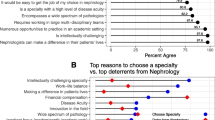Abstract
Using survey items from Kern et al. (1985), 192 former residents rated their preparation in, and the importance of, three content areas of their residency training (“basic skill and knowledge areas,” “allied medical disciplines,” and “areas related to the practice of medicine”). Mean ratings replicated those reported by Kern et al. (r=0.70 to 0.97, p<0.004). Using additional data about current practice patterns, ratings by general internists were compared with ratings by subspecialists. Both groups identified basic skill and knowledge areas as most important and felt that many areas related to practice management had been underempbasized. Most allied medical disciplines, however, were more important to generalists. Exposure to non-internal medicine areas seems important for residents considering a primary care career, but not for those considering subspecialization. However, all residents may benefit from increased emphasis on basic clinical skills and practice management. Program directors may want to address these issues, given the recent decline in applications to internal medicine programs.
Similar content being viewed by others
References
Schroeder SA, Showstack JA, Gerbert B. Residency training in internal medicine: time for a change? Ann Intern Med 1986;104:554–61.
Scherr L. Graduate medical education: a vital renewal for internal medicine. Ann Intern Med 1988;108:769–71.
McPhee SJ, Mitchell TF, Schroeder SA, Perez-Stable EJ, Bindman AB. Training in a primary care internal medicine residency program: the first ten years. JAMA 1987;258:1491–5.
Brook RH, Fink A, Kosecoff J, et al. Educating physicians and treating patients in the ambulatory setting. Ann Intern Med 1987;107:392–8.
Graettinger JS. The 1988 NRMP. Ann Intern Med 1988;108:761–2.
The Task Force on the Future Internist, American Board of Internal Medicine. The future internist. Ann Intern Med 1988;108:139–41.
Aiken LH, Lewis CE, Craig J, Mendenhall RC, Blendon RJ, Rogers DE. The contribution of specialists to the delivery of primary care. N Engl J Med 1979;300:1363–70.
Kantor SM, Griner PF. Educational needs in general internal medicine as perceived by prior residents. J Med Educ 1981;56:748–56.
Boyce-Smith G, Zier B, Deller JJ. Deficiencies in the training of internists: results of a survey. West J Med 1977;127:450–2.
McCue JD. Training internists: insights from private practice. Am J Med 1981;71:475–9.
Kern DC, Parrino TA, Korst DR. The lasting value of clinical skills. JAMA 1985;254:70–6.
Mandel JH, Rich EC, Luxenberg MG, Spilane MT, Kern DC, Parrino TA. Preparation for practice in internal medicine: a study of ten years of residency graduates. Arch Intern Med 1988;148:853–6.
Magnusson D. Test theory. Reading, MA: Addison-Wesley, 1967.
Green PE. Analyzing multivariate data. Hinsdale, IL: Dryden Press, 1978.
Kleinman DG, Kuper LL, Muller KE. Applied regression analysis and other multivariate methods. Boston: PWS-Kent, 1988.
Linn L, Brook RH, Clark VA, Fink A, Kosecoff J. Evaluation of ambulatory care training by graduates of internal medicine residencies. J Med Educ 1986;61:293–302.
Goroll AH, Stoeckle JD, Leaf A. Inpatient performance of primary care residents: impact of reduction in time on the ward. J Med Educ 1979;54:392–5.
Goldman L, Shea S, Wolf M, Braunwald E. Clinical and research training in parallel: the internal medicine research residency track at the Brigham and Women’s Hospital. Clin Res 1986;34:1–5.
Goodson JD, Goroll AH, Barsky AJ, Treadway KK, Thibault GE, Stoeckle JD. The training of physicians outside the hospital. Arch Intern Med 1986;146:1805–9.
Author information
Authors and Affiliations
Additional information
Received from the Section of General Internal Medicine, Department of Medicine, Northwestern University Medical School, Chicago, Illinois.
Supported in part by a grant for Residency Training in General Internal Medicine and/or Pediatrics (1 D 28PE-15275-01) from the U.S. Public Health Service.
Rights and permissions
About this article
Cite this article
Martin, G.J., Curry, R.H. & Yarnold, P.R. The content of internal medicine residency training and its relevance to the practice of medicine. J Gen Intern Med 4, 304–308 (1989). https://doi.org/10.1007/BF02597402
Issue Date:
DOI: https://doi.org/10.1007/BF02597402




